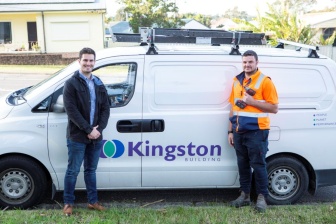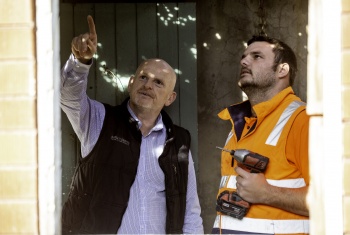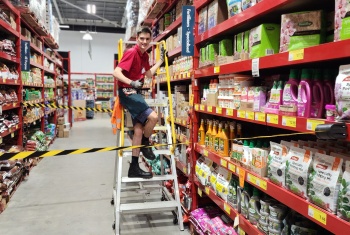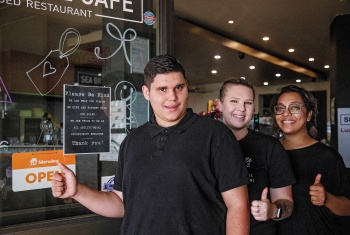Sam Proctor is proud to say he’s been working in paid employment for 3 years.
‘I work for KBA Facilities and Maintenance. It’s part of the Kingston Group, a large Newcastle commercial and residential construction company,’ he said.
‘I love my job. I work with a great bunch of blokes. I’m like a trades assistant. I help hang doors and gates, paint, remove graffiti. We do a lot of maintenance work on homes.’
With a learning delay, receptive and expressive language disorder, and Attention Deficit Hyperactivity Disorder (ADHD), the 26-year-old lacked confidence when he left school.
He had no idea what he wanted to do or how to go about looking for work.
A NDIS participant, Sam was able to talk to his planner about his situation, so employment supports were included in his plan.
It meant Sam could choose which employment supports provider he’d like to support him.
‘I chose Aruma and started working with Bobby Newton. He’s an awesome guy. He helped me to be more confident and get the skills I needed to get a job. I wouldn’t be where I am today without him,’ Sam said.
Bobby supported Sam in weekly one-on-one sessions, and they communicated regularly.
‘Bobby helped me to identify what types of jobs I liked, and he got me work experience,’ Sam said.
‘He also helped me to build and update my resume, prepare for job interviews and apply for jobs.’
Willing, punctual, and reliable, Bobby could see Sam had a lot of employment potential.
‘Sam is one of those guys who is keen to try his hand at anything. He’s a hard worker and he had a lot of the qualities employers look for. He just lacked confidence,’ he said.
KBA approached Aruma to see if they knew of any participants interested in joining an inclusive social and economic program they were running call Empower Maintenance.
‘Immediately, I thought of Sam,’ Bobby said. ‘I knew he was the perfect candidate. I supported him with the interview process 3 years ago, and he was hired.’
For Sam, all his hard work and dedication has paid off. ‘Initially, I was employed one day a week, now I’m working 2 days a week,’ he said.
‘I’ve got my probationary licence now, so it’s made it a lot easier for me to get to work.’
Bobby said NDIS employment supports have been so beneficial for Sam and for other young people with disabilities he has supported. ‘I’ve seen so many great outcomes,’ he said.
‘When you finish school it’s common to ask yourself what am I going to do now, how am I going to survive in this big bad world, am I going to work or study.
Then you think how do I find these pathways, how do I get the skills I need to get a job, how do I do a resume and what needs to go in it?
'This is where we can help to support participants to build their skills to become more confident socially and economically.
‘In a sense employment supports are routine based. It’s a bit like school, but the support is much more centred around the participant.
‘It works on building their employment and social skills and it eases them into work they are interested in and can cater to their needs.
'It’s important funding and people should ask to have it included in their plans,’ Bobby said.



